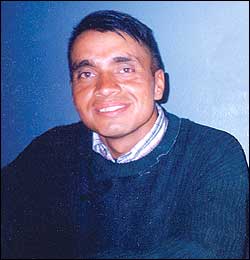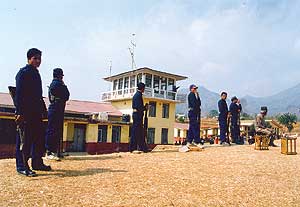 By all accounts, it was a grossly uneven fight. Two thousand battle-hardened Maoists, some armed with automatic SLRs and light machine guns were attacking a force of just 61 soldiers of the Royal Nepal Army guarding Rumjatar airfield in Okhaldhunga. After a six-hour firefight, the Maoists retreated, leaving at least 42 of their dead comrades and carrying away dozens of other dead and wounded.
By all accounts, it was a grossly uneven fight. Two thousand battle-hardened Maoists, some armed with automatic SLRs and light machine guns were attacking a force of just 61 soldiers of the Royal Nepal Army guarding Rumjatar airfield in Okhaldhunga. After a six-hour firefight, the Maoists retreated, leaving at least 42 of their dead comrades and carrying away dozens of other dead and wounded. Credit for the defence of Rumjatar goes to Captain Dinesh Thapa, 30, who died in the fierce gun-battle. Captain Thapa's preparation, his ability to get advance intelligence of the impending attack, and his solid defences around the airfield allowed soldiers under his command to fight on.

Captain Thapa was single, and the son of veteran army colonel, Nar Bahadur Thapa. He was a born soldier, often leading his units deep into the surrounding mountains, where they had their ears close to the ground. In an interview in the control tower of Rumjatar airport just ten days before his death, he told us: "Our army is capable and well-trained, and we can put down the Maoists. But our numbers are small." If Captain Thapa had his way, he would increase army strength to 200,000, and place units in every village. "Unemployed youth would have jobs, stability would return, and the economy would pick up," he had said.
"You can't fight this war with 20,000 soldiers in such terrain," he added, gesturing at the mountains towering over the airstrip. In the interview, Thapa was surprisingly critical of higher officers in the army who he said didn't visit the frontlines often enough. "This affects the morale of the boys," he said. "I go to the field very chance I get, why can't they come down from Kathmandu?" Ironically, Chief of Army Staff Pyar Jung Thapa visited Rumjatar a day after the attack to pay tribute to the bravery of Captain Thapa and his men.
Dinesh Thapa was dressed in civvies and looked relaxed when he spoke to us just after Dasain. There was no hint of bitterness in his comments. He just wanted to improve conditions for his men, and win the war. He felt his unit had enough weapons, and added: "In the west, the soldiers are having a hard time not because of lack of resources, but because of carelessness." And he seemed determined not to allow a defeat during his watch.
As a Yeti Airlines Twin Otter diverted from Lukla landed on the runway below, Captain Thapa was prophetic: "The Maoists will never be able to take Rumjatar, however large their numbers." Just ten days after he spoke these words, at 10:30 pm on 28 October, the guerrillas attacked in force from all sides, pummelling the trenches and the sandbag positions with automatic fire and grenades.
 Thapa was in the same air traffic control tower where we had spoken. He was in radio contact with the army base up the ridge in Okhaldhunga, and was asking for reinforcements. The base was telling him that two helicopters were on their way from Kathmandu. He had just left the tower and was running to a gun position when he was felled by a grenade. Army officials later said Captain Thapa's defences were so impregnable, the attacking force couldn't even cross the barbed wire fence surrounding the airport.
Thapa was in the same air traffic control tower where we had spoken. He was in radio contact with the army base up the ridge in Okhaldhunga, and was asking for reinforcements. The base was telling him that two helicopters were on their way from Kathmandu. He had just left the tower and was running to a gun position when he was felled by a grenade. Army officials later said Captain Thapa's defences were so impregnable, the attacking force couldn't even cross the barbed wire fence surrounding the airport. In Kathmandu on Thursday, army spokesman Colonel Deepak Gurung was full of praise for the unit: "They were heavily outnumbered, but they were very disciplined and kept on fighting valiantly even after Captain Thapa
was killed."


